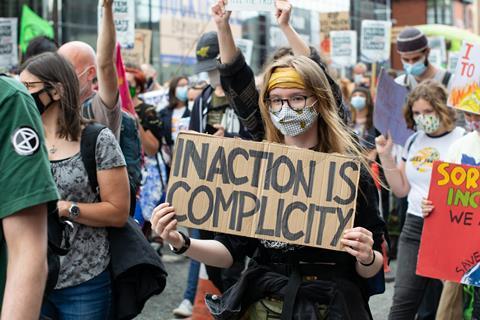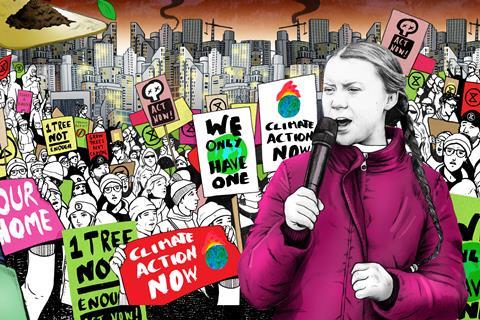In an alternative reality, the UN Climate Change 26th Conference of the Parties (COP26) in Glasgow would have wrapped up yesterday.
In the real world, the conference was postponed back in April when it became all too apparent that bringing people together from all corners of the planet in the middle of a pandemic would be a terrible idea.
It is impossible to know what steps forward world leaders might have taken had COP26 gone ahead as planned. We can safely assume the US would have played no meaningful part in proceedings, given that it formally left the Paris Agreement on 4 November.
The good news is that president-elect Joe Biden has pledged to re-join on day one of his presidency, so next year’s rearranged COP26 event could get very interesting.
However, Covid-19 could yet deal a significant blow to the fight against climate change.
Prior to the 2008 global financial crisis, the UK property industry had started to adopt greener policies and behaviours. But in the aftermath of the crisis, many businesses focused their efforts on survival and the nascent green movement fizzled out.

As the latest crisis has dragged on, the danger is that the property industry will hit the brakes again on the climate agenda. So are people still as committed as they were back in June when Property Week held its Climate Crisis Challenge Virtual Event or has confidence started to wane?
It is hard to see how the climate agenda could have done anything other than slip down the agenda as the economic impact of Covid-19 has snowballed.
The cost of Covid-19 to the public purse makes the damage wreaked by the global financial crisis look like small beer.
According to research from Deloitte, governments around the world have collectively already committed $10trn (£7.6trn) to supporting their economies during the pandemic – three times more than the support put in place to tackle the last financial crisis.
The private sector has also taken a battering and the property industry has not been immune. Landlords across most sectors have suffered shortfalls in rental payments and the share prices of public property companies have been hit hard.
However, despite the turmoil, companies in property and the built environment do not show any signs of reneging on their green commitments.
“I will say that thought crossed my mind several times when we first went into the pandemic,” admits Lizzie Jones, sustainability manager at Savills. “But from the activity that I’ve seen from our clients in the UK and across Europe, it does not appear [Covid] is pulling down the [climate] agenda. Build back better is something that clients are really focusing on.”
Government commitment
Jones adds that the government also appears to remain committed to the climate cause.
This week, it published its 10-point plan for a green industrial revolution. Last week, chancellor Rishi Sunak announced that all large companies and financial institutions would have to report on their climate risks by 2025 and that Britain’s first green gilt would be issued to raise money for investment in carbon-reducing projects.
The business case for green buildings is also far clearer today than a decade ago. For many years, there was little evidence that an energy-efficient office, for example, could command higher rents. That is no longer the case.

Fresh research on the subject from Savills is due to be published imminently and Jones says it is conclusive.
“There’s a clear link between the properties that have got sustainability accreditation and the price per sq ft that landlords are charging for those properties,” she says. “And then there is also decreased running costs for that space. One example showed there was a 12% fall in running costs for an energy-efficient building.”
In other words, both landlord and occupier benefit. People also increasingly understand that companies that provide green buildings and services perform better than the cross-industry average.
Munish Datta, director of membership and operations at the UK Green Building Council (UKGBC), points to a Morgan Stanley index that compares the performance of stocks and shares in all markets and industries with a tracker that monitors organisations for which green buildings and services make up more than 50% of their turnover.
Green outperformers
“[The latter] organisations are way outperforming the market now,” he says. “They’re not big, but in terms of performance, the gap is widening between them and the standard indices.
“Even in the past six months, if you really zoom down into the data, that performance has been maintained. Obviously, both have dipped, but the dips the standard market is seeing are deeper than those in green aligned stocks and shares.”
Many commentators add that the societal context today is vastly different to 2008. The public mood has turned and concern about climate change is now mainstream. Put simply, companies cannot afford to ignore that concern.
“I think that the environment we’re in is really quite different,” says André Gibbs, partner at Argent Related. “People like Greta Thunberg and Joe Biden, and most people in the world who are in leadership positions, except perhaps the outgoing president of the US, are recognising that this is an important global issue.
“Most leaders can point to things that are happening. We’re up to 29 named storms in the Atlantic this year. That’s a record. It’s difficult for people to bullshit their way out of the science these days.”
According to Datta, the pandemic has only heightened awareness of environmental issues. “People have really started thinking about how the virus affects them,” he says.
It’s got to be net-zero because we really only get one shot
Basil Demeroutis, FORE
“They could die from it and they’ve started thinking about bigger risks in their lives. They’ve had time to ponder and commit to this more than they would have otherwise. That applies to businesses, too.”
Gibbs’ colleague Claudine Blamey, head of sustainability and digital strategy at Argent, agrees, adding that public sentiment means investors are increasingly focused on environmental issues, which in turn applies pressure across the rest of the property industry.
“Thunberg just completely changed people’s perspective on this,” she says. “Investors are really interested in it now as well. There’s a huge amount of green finance and everyone wants to build and build better.”
That chimes with Omega Poole’s experience. The partner and head of debt advisory at Mishcon de Reya says that investors are increasingly focused on their environmental, social and governance (ESG) strategies.
“We always have to look at what the money is doing to see where the change will happen,” she says. “So, we’ve seen that capital allocators are incredibly focused on ESG. And we’re seeing rules for big pension funds and institutions coming into play.

“In terms of real estate finance providers, I spend much of my time speaking to lenders and most of the institutional lenders that I speak with have ESG as one of their focus points.”
That is something that is reflected in new members of UKGBC. Datta says the organisation saw unprecedented growth in membership in 2019/20 and that it has been maintained throughout the pandemic. Moreover, many of those new members are financial institutions rather than the developers or contractors that formed UKGBC’s traditional membership base.
“In the last six months, Lloyds has joined us, HSBC has joined us, Aviva Investors has joined us,” he says. “The reason the finance sector is so taken by the built environment is that the risks we’re going to face from climate change are going to affect buildings in terms of asset types the most. It’s going to be a disproportionately high effect. These are serious asset risks.”
Timing is also a factor. The world now has just 30 years to achieve net-zero-carbon, a period of time familiar to commercial landlords – after all, the usual lifecycle for mechanical and electrical equipment is around 30 years.
One cycle to go
“We’ve got basically one refurbishment cycle to go,” says Basil Demeroutis, managing partner at FORE Partnership.
“If you refurbish the building next year, that’s going to be the same kit that will be in there in 2050. That stuff has got to be net-zero now, because you’re not going to turn around and rip out stuff you just installed in five or 10 years. It’s got to be net-zero because we really only get one shot.”
So, the consensus is that the property industry is serious about its environmental commitments this time.
There is one important caveat, however. Andrew Waugh, founder and director at architect Waugh Thistleton, makes a strong distinction between commercial property and residential. Most housebuilders, he believes, are way behind commercial developers.
“The residential market is not as sophisticated as the office market,” he says. “You see various kind of commitments made by residential developers to sustainability and then you track back and realise they’re just meeting building regulations. When you’re selling an office, you’re not fulfilling a need, you’re selling an aspiration for space. The market is more discerning.”
In short, Covid-19 may have won the battle against the climate, but it hasn’t won the war. The momentum behind the climate agenda is too great. The challenge now is to ensure no momentum is lost because time is running out for the planet – and there is no planet B.































No comments yet